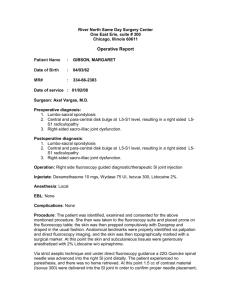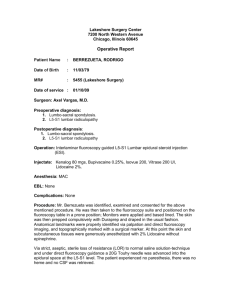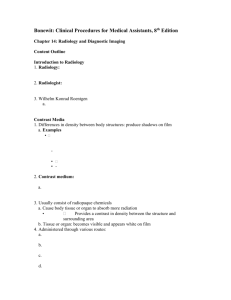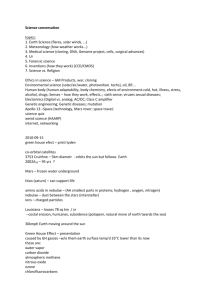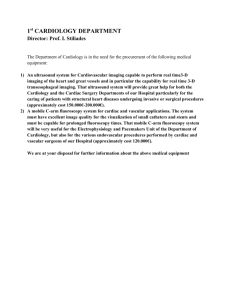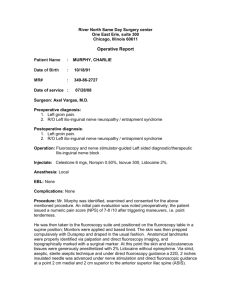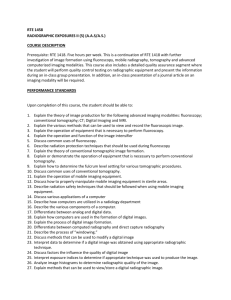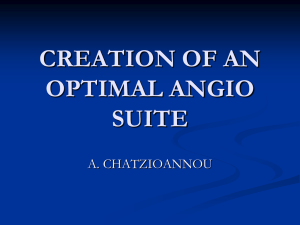Trust Board Committee Meeting: Wednesday 12 November 2014 TB2014.124
advertisement
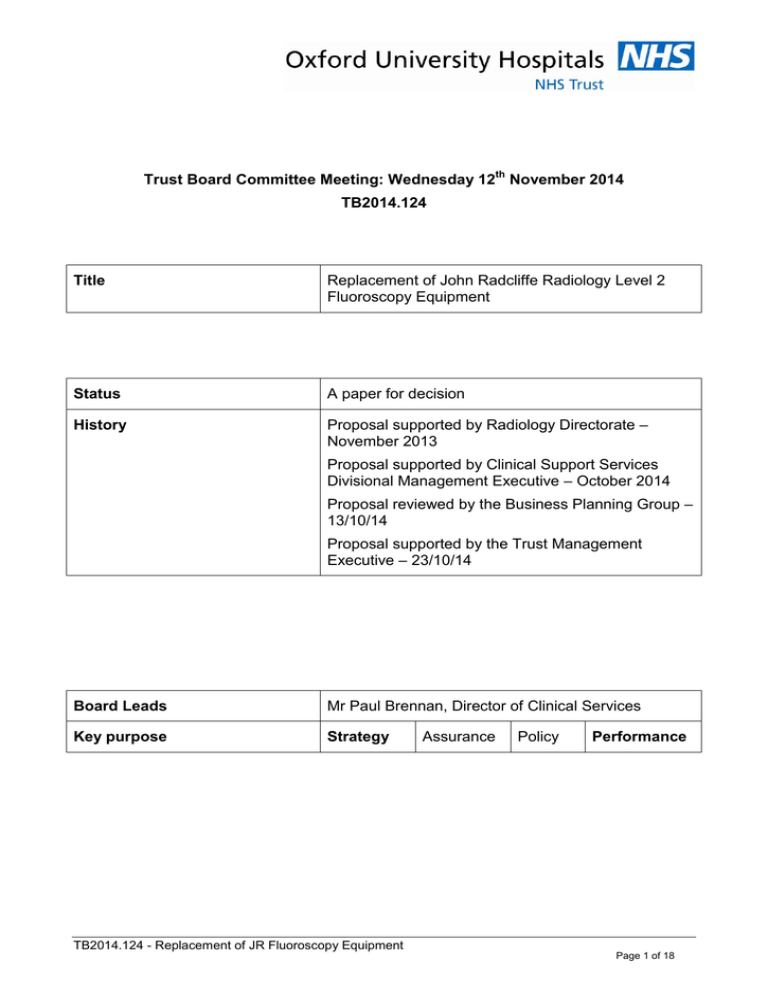
Trust Board Committee Meeting: Wednesday 12th November 2014 TB2014.124 Title Replacement of John Radcliffe Radiology Level 2 Fluoroscopy Equipment Status A paper for decision History Proposal supported by Radiology Directorate – November 2013 Proposal supported by Clinical Support Services Divisional Management Executive – October 2014 Proposal reviewed by the Business Planning Group – 13/10/14 Proposal supported by the Trust Management Executive – 23/10/14 Board Leads Mr Paul Brennan, Director of Clinical Services Key purpose Strategy TB2014.124 - Replacement of JR Fluoroscopy Equipment Assurance Policy Performance Page 1 of 18 Oxford University Hospitals TME2014.124 Summary 1 The purpose of this case is to secure agreement to capital and revenue investment to replace the fluoroscopy equipment in use in room 2313 on the John Radcliffe Hospital site, with a modern multi-purpose flat plate technology fluoroscopy unit in an appropriately sized room, allowing general anaesthetic and endoscopic retrograde cholangiopancreatography (ERCP) to be carried out. This room would treat approximately 2000 patients per annum. This fluoroscopy unit is a fundamental diagnostic tool for acute surgical patients e.g. fistulography, bowel obstruction, and for routine upper and lower gastrointestinal imaging, e.g. barium swallows, proctograms for pelvic floor dysfunction, and the ERCP day cases. 2 The current equipment is 11 years old. Royal College of Radiologist guidelines recommend replacement after 7-10 years use. The age of the equipment is resulting in an unacceptable image quality and scarcity of spare parts. The existing machine is cumbersome and newer models would improve the room ergonomics making it easier and safer for both patients and staff to use. 3 The financial implications of this proposal are capital investment of £1,400k £432k to purchase a flat plate technology multi-purpose fluoroscopy unit and equipment and £968K for enabling work to allow its installation in a larger room. Funding has been identified within the Capital Programme. Additional capital charges of c. £159k per annum will be incurred from 2015/16. Maintenance costs will increase from £14k to £53k per annum from 2016/17. This will be funded from the John Radcliffe Radiology non-pay budget. Recommendation The Trust Board is asked to approve: Replacement of the fluoroscopy equipment in room 2313, Level 2 Radiology at the John Radcliffe Hospital, with a flat plate technology multi-purpose fluoroscopy unit Capital expenditure of £1,400k (£1,158k in 2014/15 and £242k in 2015/16) Annual additional revenue costs of c. £159k per annum for capital charges from 2015/16 and an increase in maintenance costs of £39k per annum from 2016/17. Replacement of John Radcliffe Radiology Level 2 Fluoroscopy Equipment TB2014.124 - Replacement of JR Fluoroscopy Equipment Page 2 of 18 Oxford University Hospitals TME2014.124 Trust Management Executive Reference TME2014.270 Appendices Appendix 1 – Radiation Physics and Protection – Equipment Performance Summary Reports (Assessments completed in July 2011, August 2012 and May 2013) Appendix 2 – Financial Analysis Background papers Endoscopy Risk Register Action/decision required from TME Support for the : Replacement of the fluoroscopy equipment in room 2313, Level 2 Radiology at the JR, with a flat plate technology multi-purpose fluoroscopy unit in a bespoke room. Capital expenditure of £1,400k (£1,158k in 2014/15 and £242k in 2015/16) Annual additional revenue costs of c. £159k per annum for capital charges from 2015/16 and an increase in maintenance costs of £39k per annum from 2016/17 Strategic Objectives that the case will SO1 - To be a patient-centred organisation, help deliver providing high quality, compassionate care with integrity and respect for patients and staff – “delivering compassionate excellence” SO 2 - To be a well-governed organisation with high standards of assurance, responsive to members and stakeholders in transforming services to meet future needs “a well-governed and adaptable organisation” Meeting the needs of the Patient Safety Strategy, July 2008 Meeting the needs of the ‘Risk Management Strategy,’ August 2012 Meeting the needs of the ‘Quality Strategy,’ September 2013 Proposed date that revenue spend will April 2016 begin: Proposed date that capital spend will November 2014 TB2014.124 - Replacement of JR Fluoroscopy Equipment Page 3 of 18 Oxford University Hospitals TME2014.124 begin: Conclusion of Equality Analysis This is an existing service and so there would be no adverse impact. Review Date June 2015 Acronyms and abbreviations used JRH – John Radcliffe Hospital ERCP – Endoscopic Retrograde Cholangiopancreatography GA - General anaesthetic IR – Interventional Radiology MDA - Medical Devices Agency OCCG – Oxford Clinical Commissioning Group RTT – Referral To Treatment RCR - Royal College of Radiologists TVVN – Thames Valley Vascular Network Author Ms Debbie Tolley, JR Radiology Clinical Unit Operations Manager Lead Finance Manager Ms Doreen Carter, Senior Finance Business Partner Lead Estates Manager Mr Geoff Wakeling, Project Manager TB2014.124 - Replacement of JR Fluoroscopy Equipment Page 4 of 18 Oxford University Hospitals 1. TME2014.124 Strategic Context and Case for Change 1.1. Overview 1.1.1. The fluoroscopy unit in room 2313 is a fundamental diagnostic tool. It is required at the John Radcliffe Hospital (JRH) site to meet the needs of acute surgical and other inpatients that cannot be moved to another site, and to support other services based at the JRH, such as endoscopy. Some of the main diagnostic functions are; fistulography, bowel obstruction, routine upper and lower gastrointestinal (GI) imaging e.g. barium swallows, proctograms for pelvic floor dysfunction, and for the Endoscopy Service endoscopic retrograde cholangiopancreatography (ERCP) day cases. ERCP is only carried out at the JRH. Equipment is transferred from Endoscopy to Fluoroscopy to carry out four lists per week. Of these four lists, two lists are used to accommodate patients who need an anaesthetic to undergo their ERCP. 1.1.2. The equipment images between 6-12 patients per day (imaging can take between 20 minutes to 1 hour). Historically the unit has accommodated 1,805 patients per annum (Radiology Information System baseline data for 2013/14). This activity consisted of 550 ERCP patients, 55 emergency patients, 250 inpatients/day-case patients and 950 outpatients. Due to issues with the equipment and size of the unit (described in subsequent paragraphs), it has been necessary to relocate approximately 250 ERCP patients to Interventional Radiology (Oasis) for their procedure. 1.1.3. This case is not expected to provide an increased throughput of patients. 1.1.4. This case seeks approval for capital and revenue investment to replace the current fluoroscopy equipment with a modern multi-purpose c-arm fluoroscopy unit with flat plate technology, and reconfigure the current room to accommodate both the new equipment and the staff and equipment required to deliver the ERCP service. 1.2. Issues with the Current Fluoroscopy Equipment and Accommodation 1.2.1. The life expectancy of fluoroscopy equipment is 7-10 years. The current equipment is 11 years old which has resulted in a number of related issues. These necessitate its replacement. 1.2.2. Image Quality: The last 3 years Equipment Performance Summary Reports (Appendix 1) show that Medical Physics have recommended that the machine be replaced every year. The image quality is poor (at or below the Medical Devices Agency (MDA) standard of 1995) and at some magnifications unacceptable. There is a significant risk that a misdiagnosis or missed pathology could occur as a result. This could have a detrimental impact on the subsequent clinical management of the patient. For visualisation of oesophageal or biliary stents a static image needs to be acquired and then viewed on PACS whilst the patient is still on the table. This increases the examination time and the radiation dose to the patient. 1.2.3. Equipment Age and Reliability: The equipment suppliers guarantee to maintain the equipment for 7 years following production. Spare parts are no longer guaranteed to be replaced. The inability to guarantee maintenance and repair of the fluoroscopy equipment creates potential for an irretrievable TB2014.124 - Replacement of JR Fluoroscopy Equipment Page 5 of 18 Oxford University Hospitals TME2014.124 breakdown. This would severely affect the delivery of the fluoroscopy service at the JRH and delay diagnosis and subsequent clinical management of the patient’s condition. It will also have a detrimental impact on the endoscopy ERCP service that uses fluoroscopy and endoscopy together to diagnose and treat problems of the bile and pancreatic ducts on day case patients. 1.2.4. Suitability of Current Accommodation – size of room 2313: The current room is considered unsafe by the Endoscopy Service (Endoscopy Risk Register, available as a background paper). The current room size and configuration does not support access to the patient and maintain their safety, particularly when patients are sedated, requiring a general anaesthetic (GA), critically ill or elderly and infirm. This has resulted in the need to move two lists per week to the Interventional Radiology room (Oasis) on Level 1 (as already mentioned). 1.2.5. The need to relocate this work has had a number of consequences : The Interventional Radiology (IR) service supports the Trust as the hub of the Thames Valley Vascular Network, (TVVN). The service provides 24/7 interventional radiology to TVVN and the Major Trauma Centre. This service is at full capacity and has over the last 6 months breached the 18 weeks referral to treatment target (RTT) for vascular interventional radiological procedures. In 2013-14, 157 excess RTT breaches were attributed to Radiology, (value £7,065 at £45 each). In the first quarter of 2014-15, there have been 21 excess RTT breaches (value £4,200 at £200 each). These are mainly due to a lack of capacity in IR, the 250 GA-ERCP patients compounds this problem. Therefore it is important that the GA-ERCP cases currently carried out in this room are moved back to fluoroscopy room 2313. 1.2.6. Replacement of the current equipment with a modern multi-purpose c-arm fluoroscopy unit with flat plate technology, in an appropriately sized and configured room will address the potential risks associated with the current service, namely: Improved image quality – removing the risks associated with image quality and the age of the equipment. Allows easy and complete access to the patient to facilitate care and imaging of the elderly, infirm, anaesthetised and critically ill patients and during emergency events. Current difficulties in sourcing replacement parts for the equipment with the potential for significant unplanned down time will be mitigated. TB2014.124 - Replacement of JR Fluoroscopy Equipment Page 6 of 18 Oxford University Hospitals 2. TME2014.124 Objectives and Benefit Criteria 2.1. The Radiology Service has identified the following aims for this service development : 3. 2.1.1. Replace current equipment with a multi-purpose, flat plate technology fluoroscopy unit, minimising the risks of unplanned equipment downtime or irretrievable breakdown. 2.1.2. Improve the diagnostic quality of fluoroscopy imaging. 2.1.3. Maintain patient safety, particularly when they are sedated, critically ill or elderly and infirm, by using equipment and a room which allows enough space to safely access the patient, with the full team of staff required. 2.1.4. Provide capacity to ensure local and national access standards are achieved e.g. 4 hour emergency access, 6 week diagnostic target, 24/7 inpatient access, 18 week RTT (for ERCP). Options 3.1. The following options are considered : 3.1.1. Option 1 – Do nothing – Continue to use current equipment. 3.1.2. Option 2 – Relocate work from room 2313 to other facilities in the Trust – This option would eliminate the requirement to replace the equipment and provide a larger room, with work being displaced to: JR-IR suite (Room 11 and Oasis) the Churchill Fluoroscopy Unit Children’s Hospital Fluoroscopy at the JR 3.1.3. Achieving this would require the four ERCP sessions and inpatient fluoroscopy (total 800 patients per year) to move to JR-IR suite (Room 11 and Oasis). Subsequently eight sessions of existing JR-IR day cases would need to be moved to the Churchill IR. Capacity for 384 patients has been identified, which is insufficient to accommodate this group of patients. Some of the patients require vascular support which is not readily available at the Churchill. In addition approximately 950 outpatients would need to be relocated to other fluoroscopy units across the trust, predominantly at the Churchill site. It has not been possible to identify sufficient capacity for this group. 3.1.4. As there is insufficient capacity to accommodate the displaced work, this option is not considered any further. 3.1.5. Option 3 – Replace the current fluoroscopy equipment with new technology Scoping showed that the existing room is not large enough for the replacement equipment. Therefore this option is not considered further. 3.1.6. Option 4 – Install a replacement multi-purpose flat plate technology fluoroscopy unit in a larger room. TB2014.124 - Replacement of JR Fluoroscopy Equipment Page 7 of 18 Oxford University Hospitals 4. TME2014.124 Option Appraisal using Benefit Criteria OPTION 1 OPTION 4 Do Nothing Replace the fluoroscopy equipment in room 2313 (with an increase in room size) Replace aged equipment X √ Improve safety by better access to the patient on the fluoroscopy table X √ Improve diagnostic fluoroscopy images of X √ Achieve local & national access standards X √ quality 4.1. Option 1 would have no additional cost. However from 2012-14, £3k has been spent on repairs, outside of the £11k maintenance contract. In 2013-14 157 excess RTT breaches were attributed to radiology (value £7.1k). In the first quarter of 14-15, there have been 21 excess RTT breaches at a value of £4.2k. The existing clinical and operational risks would remain compromising the safety of patients. 4.2. Option 4 - This option would cost £1,400k capital in order to replace and carry out the necessary building works required to provide a fluoroscopy service with the latest imaging technology and design ergonomics. Capital charges will increase by c. £159k per annum and maintenance costs will increase from £14k to £53k. 5. Recommended option and how it meets the case for change 5.1. Option 4 meets the requirements of the current case for change i.e. to address and mitigate the existing clinical and operational risks associated with the current equipment and replace it with a product that is fit for purpose. 6. Financial Analysis of Preferred Option 6.1. Revenue Costs 6.1.1. The replacement of the current equipment is not expected to have an impact on patient numbers. 6.1.2. The maintenance costs after the 1 year warranty will increase over current levels by £39k, to £53k per annum as flat plate technology equipment is more expensive to maintain than the current equipment. This cost will not be incurred until April 2016 as there is a 1 year manufacturer’s warranty following installation. There will be an additional maintenance charge from clinical engineering for £23k per annum. TB2014.124 - Replacement of JR Fluoroscopy Equipment Page 8 of 18 Oxford University Hospitals 6.1.3. TME2014.124 There is the potential to reduce expenditure through the avoidance of fines relating to RTT performance in Interventional Radiology due to competing need for space (£4.2k per quarter). However a reduction in fines has not been incorporated into the financial analysis as this cannot always be attributed to one problem in the pathway. 6.2. Capital Costs 6.2.1. Capital investment totalling £1,400k will be required (with an equipment cost of £432k (inclusive of VAT) and enabling works of £968k). Provision has been made within the Capital Programme for this investment. 6.3. Cost of Capital 6.3.1. Based upon £1,400k capital expenditure; depreciation and capital charges will be £11k (part year), £159k (full year) falling to £151k by 2018/19. 6.4. Income 6.4.1. No additional income will be generated as this is an equipment replacement case. 6.5. Contribution 6.5.1. 7. There will be a non-recurrent increase in contribution of £14k in 2015/16 as maintenance costs will not be incurred in the first year after installation. Market Assessment (including commissioner discussions) 7.1. The John Radcliffe Hospital is an acute and emergency care hospital and provides tertiary referral services for patients with upper and lower GI problems. It is required to care for patients with complex clinical conditions. Fluoroscopy is a fundamental diagnostic tool for acute surgical patients, e.g. fistulography, bowel obstruction, and for routine upper and lower GI imaging, e.g. barium swallows, proctograms for pelvic floor dysfunction, and the endoscopy ERCP day cases, therefore it is essential the Trust continues to provide this service at the JR. Replacement of the room will not have an impact on commissioning. 8. Benefits Realisation 8.1. The table below shows the quantifiable benefits of the proposal and the plan for achieving them. Benefit Performance Measure Current Value Reduced clinical and operational risks associated with an appropriately designed and located facility Current risk for patient access during sedation and GA procedures GA cases can no longer be performed in the room due risk. All GA cases can be performed in room 2313. May 2015 Reduce workload in Interventional Radiology room by bringing back GA Breaches reduced in Interventional room – as ERCP 15 week wait for patients to undergo a procedure in 0 breaches due to ERCP cases in Interventional May 2015 TB2014.124 - Replacement of JR Fluoroscopy Equipment Target Value Target Date Page 9 of 18 Oxford University Hospitals Benefit 9. TME2014.124 Performance Measure Current Value Target Value Target Date cases to room 2313. and GA case load referred to room 2313. the Interventional Radiology room in last 6 months. Radiology at JR. Improved diagnostic image quality Comparison of image quality with current multipurpose flat plate technology fluoroscopy facilities within Radiology Directorate Current image quality below MDA standard of 1995. Image quality is up to date and of required standard for carrying out relevant procedures. May 2015 Management of Risks of Implementation of Proposal Likelihood (L) Total (IxL) Mitigating Action Impact (I) Risk Completing project to anticipated timescale 3 3 9 Maintaining service continuity 4 4 16 Completing project within allocated budget 2 2 4 Regular project team meetings, with review of progress against plan. Corrective action taken to address slippage. Work will be displaced temporarily to Rm 2315. Once Rm 2313 is replaced work can be relocated. Minimal disruption is anticipated. Contingency within Estates budget for addressing unforeseen building issues. Estates project management. Preliminary exploration work. Residual Risk 9.1. The table below lists the risks that would remain if the proposal is agreed and the plan to manage them. 6 2 2 Contingency plan to address risk Contingency not really required as continuity is maintained (see below) Non identified None identified 10. Implementation Plan TB2014.124 - Replacement of JR Fluoroscopy Equipment Page 10 of 18 Oxford University Hospitals TME2014.124 10.1. Estates Project Lead to co-ordinate meetings and planning process with Siemens Healthcare and service users. Dr Suzie Anthony, Clinical Director for Radiology will be the Project Lead for the service supported by Debbie Tolley, Clinical Unit Operations Manager. Action Timeline Business Case approved by CSS DME October 2014 Business Case approved by TME 23rd October 2014 Business Case approved by the Trust 12th November 2014 Board Pre-installation works start on site December 2014 Works completed on site March 2105 Commissioning completed April 2015 Room brought into operational use May 2015 10.2. The impact and intended effect of this project will be reviewed and reported on 6 months following completion of the scheme. 11. Conclusion 11.1. The existing aged equipment requires replacement. Option 4 of this proposal would deliver equipment in accommodation that is fit for purpose and as a result will reduce the clinical and operational risks that exist with the current equipment. 12. Recommendations 12.1. The Trust Board is asked to approve option 4. This will result in the replacement of the fluoroscopy equipment in room 2313 with a product that is fit for purpose and mitigates the risks that exist with the current equipment and environment. This will require : Capital expenditure of £1,400k Annual additional revenue costs of c. £159k per annum for capital charges from 2015/16 and an increase in maintenance costs of £39k per annum from 2016/17. Paul Brennan, Director of Clinical Services Professor Fergus Gleeson, Divisional Director, CSS Dr Suzie Anthony, Clinical Director, Radiology Debbie Tolley, JR Radiology Clinical Unit Operations Manager October 2014 TB2014.124 - Replacement of JR Fluoroscopy Equipment Page 11 of 18 Appendix 1 Radiation Physics and Protection, Haemotology and Cancer Centre, Churchill Hospital, Oxford, OX3 7LE Telephone: 01865 235324 / Fax: 01865 235325 DIAGNOSTIC RADIOLOGY - EQUIPMENT PERFORMANCE SURVEY REPORT REPORT NO: JRXR/13051 REPORT DATE: 23-May-13 HOSPITAL: DEPARTMENT: JR Radiology SYSTEM NAME & ID: GENERATOR: FLUORO X-RAY TUBE: RAD X-RAY TUBE: Siemens Sireskop serial no. 04614 REASON FOR VISIT: DATE OF VISIT: TESTS PERFORMED BY: SURVEY DETECTOR(S) USED: PREVIOUS RELEVANT REPORTS: Re-test after reported poor quality images 22/05/2013 JL/JKB Barracuda Aug-12 JRXR/12088 Nov-12 JRXR/12128 Gayle Barton, Carol Pickering, Debbie Tolley Optitop REPORT SENT TO: 1. Summary of Measurements Performed Fluoroscopy & Fluorography Entrance skin doserates II/FP Input doserates (automatic control) Display monitor setup Image noise levels Contrast-detail imaging performance Limiting resolution Uniformity of focus Field size and distortion NT C1 A C2 C2 C3 NT NT Code as follows: A – Acceptable result, R – Recommendation given below, NT - Not tested/required at this visit Summary of Comments and Recommendations Action by C1: Image intensifier input doserates and doses have been adjusted back to baseline levels. NA C2: Contrast sensitivity as measured using Leeds test objects TO10 and N3 remains poor for pulsed fluorosopy modes, in spite of engineers adjustments in 16 Nov 2012. NA C3: Measurements of high contrast resolution have improved as a result of engineers adjustments. NA Please return this form within Four weeks of receipt. 3. Conclusions Image quality on this system is largely unchanged compared to previous measures in August during the 2012 annual quality checks and last November: following the engineers adjustments to return input doses to specification levels whilst trying to improve image quality. Contrast sensitivity for fluoroscopy remains poor compared to a "modern system in average adjustment" and as stated in previous reports the unit should be considered for replacement in line with recommendations in HSE PM77 on ageing equipment. Given the nature of reported image quality problems prior to the visit, the clinical case-mix for this system should be reviewed so that examination imaging requirements do not exceed the imaging capability of the system. For large patients contrast sensitivity maybe improved by implementing the dose escalation regime given below. Dose Escalation Regime for large patients: 8pps to 12.5 pps to continuous fluoroscopy (during which the Cu skin sparing filter is removed), to F3 mode continuous fluoroscopy (which is double the dose of F1). Corrective Actions Undertaken Signed Radiation Protection Supervisor Comments Date Corrective Actions Acknowledged Signed Radiation Protection Adviser Comments Date Page 12 of 18 Radiation Physics and Protection, Haemotology and Cancer Centre, Churchill Hospital, Oxford, OX3 7LE Telephone: 01865 235324 / Fax: 01865 DIAGNOSTIC RADIOLOGY - EQUIPMENT PERFORMANCE SURVEY REPORT REPORT NO: JRXR/12088 REPORT DATE: ######## HOSPITAL: DEPARTMENT: JR Radiology SYSTEM NAME & ID: GENERATOR: FLUORO X-RAY TUBE: RAD X-RAY TUBE: Siemens Sireskop serial 04614 REASON FOR VISIT: DATE OF VISIT: TESTS PERFORMED BY: SURVEY DETECTOR(S) USED: PREVIOUS RELEVANT REPORTS: Annual Performance Measurements 9.8.12 JL/JKB Barracuda JRXR/XR/06911 (Nov 2011) REPORT SENT TO: Donna Horwood/ D.Tolley Level 2 Optitop 1. Summary of Measurements Performed General Radiation Safety Environment survey X-ray beam limitation & alignment X-ray tube leakage Operation of controls & warning devices DAP meter calibration NT A A A A Automatic Exposure Control Performance Repeatability Consistency between chambers Reproducibility - kV Reproducibility - Phantom Thickness Operation of Guard Timer A A C3 A A Tube and Generator kVp accuracy Variation of output with kV, mAs Accuracy and repeatability of timer Total filtration Focal spot size Fluoroscopy & Fluorography Entrance skin doserates II/FP Input doserates (automatic control) Display monitor setup Image noise levels Contrast-detail imaging performance Limiting resolution Uniformity of focus Field size and distortion A A A A NT A C1 A C2 C2 C2 NT Code as follows: A – Acceptable result, R – Recommendation given below, NT - Not tested/required at this visit Summary of Comments and Recommendations Action by C1: Image intensifier input dose-rates have increased compared to previous measurements and for the 30 and 17cm fields, are at the IPEM 91 tolerance limit of 25%. C2: As stated last year, under normal operating conditions, image quality on this intensifier system is poorer than for a system in average adjustment. Low contrast sensitivity is poor for pulsed fluoroscopy and high contrast resolution has deteriorated compared to previous measures. It is unlikely that any improvement is possible C3: The notice regarding AEC offset usage should still be adhered to. Please return this form within Four weeks of receipt. 3. Conclusions Given the poor level of image quality for this system and the fact that dose-rates are increasing (in line with an ageing intensifier), this system should be considered for replacement. This was proposed in last years report and is in line with HSE PM77 recommmendations on ageing equipment. Also, as previously noted F3 fluoroscopy mode gives twice the dose-rate of F1 and F2 and should not be used. Signed Comments Radiation Protection Supervisor Date Corrective Actions Acknowledged Signed Comments Radiation Protection Adviser Date Page 13 of 18 DIAGNOSTIC RADIOLOGY - EQUIPMENT PERFORMANCE SURVEY REPORT REPORT NO: REPORT DATE:17/11/11 JRXR/XR/06911 HOSPITAL: DEPARTMENT: JR Radiology level 2 SYSTEM NAME & ID: GENERATOR: FLUORO X-RAY TUBE: RAD X-RAY TUBE: Siemens Sireskop serial 04614 REASON FOR VISIT: DATE OF VISIT: TESTS PERFORMED BY: SURVEY DETECTOR(S) USED: PREVIOUS RELEVANT REPORTS: Annual Performance Measurements 14.7.11 SM/JKB Unfors REPORT SENT TO: Gayle Barton Optitop 1. Summary of Measurements Performed General Radiation Safety Environment survey X-ray beam limitation & alignment X-ray tube leakage Operation of controls & warning devices DAP meter calibration A A A A A Automatic Exposure Control Performance Repeatability Consistency between chambers Reproducibility - kV Reproducibility - Phantom Thickness Operation of Guard Timer A A A A A Tube and Generator kVp accuracy Variation of output with kV, mAs Accuracy and repeatability of timer Total filtration Focal spot size A A A A A Fluoroscopy & Fluorography Entrance skin doserates II/FP Input doserates (automatic control) Display monitor setup Image noise levels Contrast-detail imaging performance Limiting resolution Uniformity of focus Field size and distortion A A A C1 C1 C1 A A Code as follows: A – Acceptable result, R – Recommendation given below, NT - Not tested/required at this visit 2. Recommendations Under normal operating conditions, image quality on this intensifier system is poorer than for a system in average adjustment. Low contrast sensitivity is poor for pulsed fluoroscopy and high contrast resolution has deteriorated compared to previous measures. It is unlikely that any improvement is possible. Also, the accuracy of the DAP Meter for the under-couch tube exceeds the tolerance limit of 20%. The engnieer should check and adjust at the next visit. 3. Conclusions Given the poor level of image quality for this system it should be considered for replacement in line with HSE PM77 recommmendations on ageing equipment. Also, as previously noted F3 fluoroscopy mode gives twice the dose-rate of F1 and F2 and should not be used. If there are any queries please contact: Signed: (Tel. 01865 235331) Page 14 of 18 Appendix 2 Business Case: EXPENDITURE JR Fluoroscopy Replacement Baseline/b Proposal udget 2014/15 2014/15 WTE WTE 2015/16 WTE Based on completion ready for May 15 2016/17 WTE 2017/18 WTE Baseline/b Proposal udget 2018/19 2014/15 2014/15 WTE £000s £000s 2015/16 £000s 2016/17 £000s 2017/18 £000s 2018/19 £000s A. Direct revenue costs Staff (specify grade & wte) Consultants Sub total 0.00 0.00 0.00 0.00 0.00 0.00 0 0 0 0 0 0 Sub total 0.00 0.00 0.00 0.00 0.00 0.00 0 0 0 0 0 0 Sub total 0.00 0.00 0.00 0.00 0.00 0.00 0 0 0 0 0 0 Sub total 0.00 0.00 0.00 0.00 0.00 0.00 0 0 0 0 0 0 Sub total 0.00 0.00 0.00 0.00 0.00 0.00 0 0 0 0 0 0 Sub total 0.00 0.00 0.00 0.00 0.00 0.00 0.00 0.00 0.00 0.00 0.00 0.00 0 0 0 0 0 0 0 0 0 0 0 0 14 14 0 53 53 53 14 14 0 53 53 53 14 14 0 53 53 53 Junior Medical Nursing Scientific & Therapeutic Other Clinical Non Clinical Reception staff band 2 Total Staff Non-Staff (inc VAT) Maintenance Costs Equipment consumables Total non staff Total Direct Revenue costs A B. Indirect revenue costs Staff (specify grade & wte) Radiological Sciences Sub total Pharmacy 0.0 0.0 0.0 0.0 0.0 0.0 0 0 0 0 0 0 Sub total Therapies 0.0 0.0 0.0 0.0 0.0 0.0 0 0 0 0 0 0 Sub total Laboratory Medicine 0.0 0.0 0.0 0.0 0.0 0.0 0 0 0 0 0 0 Sub total Theatres/Anaesthetics 0.0 0.0 0.0 0.0 0.0 0.0 0 0 0 0 0 0 Sub total Critical Care 0.0 0.0 0.0 0.0 0.0 0.0 0 0 0 0 0 0 Sub total Others 0.0 0.0 0.0 0.0 0.0 0.0 0 0 0 0 0 0 Sub total Total Staff 0.0 0.0 0.0 0.0 0.0 0.0 0.0 0.0 0.0 0.0 0.0 0.0 0 0 0 0 0 0 0 0 0 0 0 0 0 0 0 0 0 0 0 0 0 0 0 0 432 726 242 Non Staff Radiological Sciences Pharmacy Laboratory Medicine Theatres/Anaesthetics Critical Care Equipment servicing Revenue set up costs (e.g. IT, Furniture, fittings etc) Outpatient costs Facillities Costs (e.g. catering, linen) Others Total non staff Total Indirect Revenue costs B C. Capital Expenditure Equipment Refurbishment (including contingency) C. Capital Expenditure D. Capital Charge & Depreciation C D 0 1,158 11 242 159 0 159 0 155 0 151 E. Contribution to Corporate Overheads @ 15% E 2 4 24 32 31 31 F. TOTAL REVENUE COST F 16 29 182 244 239 234 Page 15 of 18 TME.124 Appendix 2 - Financial Analysis - Replacement of JR Fluroscopy Equipment 04/11/2014 Business Case: Activity & Income G. Activity (specify HRGs) JR Fluoroscopy Replacement Baseline/ budget Proposal 2014/15 2014/15 2015/16 2016/17 2017/18 2018/19 A & E attendances Emergency HRGs Subtotal emergency Elective HRGs 0 0 0 0 0 0 Subtotal elective Day Case HRGs 0 0 0 0 0 0 Subtotal daycase Outpatient new Outpatient follow-up Subtotal outpatient Other Other 0 0 0 0 0 0 0 0 0 0 0 0 H. Income £000s £000s £000s £000s £000s £000s A & E attendances Emergency HRGs Elective HRGs Day Case HRGs Outpatient new Outpatient follow-up Other Other Subtotal NHS/PCT 0 0 0 0 0 0 0 0 0 0 0 0 Private Patient R&D Other non NHS clinical Charitable Funds Other Total Income Analysis of income by PCT The following table is to indicate changes to current PCT income flows. If future years will alter significantly from this please make clear reference in your business case narrative. 2014/15 Activity Spells Source of Income A&E Emergency Other OP- New/Fup Day case Elective Commissioner Sub total NHS/PCT 0 0 0 0 0 0 0 0 0 0 0 0 Private Patient R&D Other non NHS clinical Charitable Funds Other Total 2013/14 Income Source of Income Spells A&E Emergency Elective Day case OP- New/Fup £000s £000s £000s £000s £000s Other £000s Commissioner Sub total NHS/PCT 0 0 0 0 0 0 0 0 0 0 0 Private Patient R&D Other non NHS clinical Charitable Funds Other Total 0 Page 16 of 18 TME.124 Appendix 2 - Financial Analysis - Replacement of JR Fluroscopy Equipment 04/11/2014 Business Case: JR Fluoroscopy Replacement Baseline/ budget 2014/15 WTE SUMMARY Proposal 2014/15 WTE 2015/16 WTE 2016/17 WTE 2017/18 WTE 2018/19 WTE Baseline/ budget 2014/15 £000s Proposal 2014/15 £000s 2015/16 £000s 2016/17 £000s 2017/18 £000s 2018/19 £000s A. Direct revenue costs Staff Consultants Junior Medical Nursing Scientific & Therapeutic Other Clinical Non Clinical 0.00 0.00 0.00 0.00 0.00 0.00 0.00 0.00 0.00 0.00 0.00 0.00 0.00 0.00 0.00 0.00 0.00 0.00 0.00 0.00 0.00 0.00 0.00 0.00 0.00 0.00 0.00 0.00 0.00 0.00 0.00 0.00 0.00 0.00 0.00 0.00 0 0 0 0 0 0 0 0 0 0 0 0 0 0 0 0 0 0 0 0 0 0 0 0 0 0 0 0 0 0 0 0 0 0 0 0 Total Staff 0.00 0.00 0.00 0.00 0.00 0.00 0 0 0 0 0 0 14 14 0 53 53 53 Non-Staff Subtotal Direct costs A 0.00 0.00 0.00 0.00 0.00 0.00 14 14 0 53 53 53 0.00 0.00 0.00 0.00 0.00 0.00 0.00 0.00 0.00 0.00 0.00 0.00 0.00 0.00 0.00 0.00 0.00 0.00 0.00 0.00 0.00 0.00 0.00 0.00 0.00 0.00 0.00 0.00 0.00 0.00 0.00 0.00 0.00 0.00 0.00 0.00 0.00 0.00 0.00 0.00 0.00 0.00 0.00 0.00 0.00 0.00 0.00 0.00 0 0 0 0 0 0 0 0 0 0 0 0 0 0 0 0 0 0 0 0 0 0 0 0 0 0 0 0 0 0 0 0 0 0 0 0 0 0 0 0 0 0 0 0 0 0 0 0 0 0 0 0 0 0 0 0 0 0 0 0 B. Indirect revenue costs Staff Radiological Sciences Pharmacy Therapies Laboratory Medicine Theatres/Anaesthetics Critical Care Others Total Staff Non Staff Subtotal Indirect costs B 0.00 0.00 0.00 0.00 0.00 0.00 C. Capital Expenditure D. Capital Charge & Depreciation C D 0 0 1,158 11 242 159 0 159 0 155 0 151 E. Contribution to Corporate Overheads @ 15% E 2 4 24 32 31 31 F. TOTAL REVENUE COST F 16 29 182 244 239 234 0 0 0 0 0 0 0 0 0 0 0 0 0 0 0 0 0 0 0 0 0 0 0 0 0 0 0 0 0 0 0 0 0 0 0 0 0 0 0 0 0 0 -16 -29 -182 -244 -239 -234 H. Income Total PCT Private Patient R&D Other non NHS clinical Charitable Funds Other Total Income H SURPLUS (DEFICIT) TME.124 Appendix 2 - Financial Analysis - Replacement of JR Fluroscopy Equipment 04/11/2014 Page 17 of 18 Business Case: JR Fluoroscopy Replacement Baseline/ budget 2014/15 WTE INCREMENTAL SUMMARY Proposal 2014/15 WTE 2015/16 WTE 2016/17 WTE 2017/18 WTE 2018/19 WTE Baseline/ budget 2014/15 £000s Proposal 2014/15 £000s 2015/16 £000s 2016/17 £000s 2017/18 £000s 2018/19 £000s A. Direct revenue costs Staff Consultants Junior Medical Nursing Scientific & Therapeutic Other Clinical Non Clinical 0.00 0.00 0.00 0.00 0.00 0.00 0.00 0.00 0.00 0.00 0.00 0.00 0.00 0.00 0.00 0.00 0.00 0.00 0.00 0.00 0.00 0.00 0.00 0.00 0.00 0.00 0.00 0.00 0.00 0.00 0 0 0 0 0 0 0 0 0 0 0 0 0 0 0 0 0 0 0 0 0 0 0 0 0 0 0 0 0 0 Total Staff 0.00 0.00 0.00 0.00 0.00 0 0 0 0 0 0 -14 53 0 0 Non-Staff Subtotal Direct costs A 0.00 0.00 0.00 0.00 0.00 0 -14 53 0 0 0.00 0.00 0.00 0.00 0.00 0.00 0.00 0.00 0.00 0.00 0.00 0.00 0.00 0.00 0.00 0.00 0.00 0.00 0.00 0.00 0.00 0.00 0.00 0.00 0.00 0.00 0.00 0.00 0.00 0.00 0.00 0.00 0.00 0.00 0.00 0.00 0.00 0.00 0.00 0.00 0 0 0 0 0 0 0 0 0 0 0 0 0 0 0 0 0 0 0 0 0 0 0 0 0 0 0 0 0 0 0 0 0 0 0 0 0 0 0 0 0 0 0 0 0 0 0 0 0 0 B. Indirect revenue costs Staff Radiological Sciences Pharmacy Therapies Laboratory Medicine Theatres/Anaesthetics Critical Care Others Total Staff Non Staff Subtotal Indirect costs B 0.00 0.00 0.00 0.00 0.00 C. Capital Expenditure D. Capital Charge & Depreciation C D 1,158 11 -916 147 -242 0 0 -4 0 -4 E. Contribution to Corporate Overheads @ 15% E 2 20 8 -1 -1 F. TOTAL REVENUE COST F 13 153 61 (5) (5) 0 0 0 0 0 0 0 0 0 0 0 0 0 0 0 0 0 0 0 0 0 0 0 0 0 0 0 0 0 0 0 0 0 0 0 -13 -153 -61 5 5 H. Income Total PCT Private Patient R&D Other non NHS clinical Charitable Funds Other Total Income SURPLUS (DEFICIT) H Page 18 of 18
